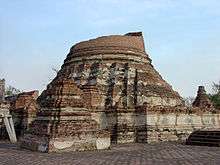Wat Kudi Dao

Ubosot of Wat Kudi Dao

Principal Chedi of Wat Kudi Dao
Wat Kudi Dao was a Buddhist temple in Ayutthaya, Thailand. It was originally built in the reign of King Narai and was restored by King Thai Sa in 1711.[1] According to documents the temple was the residence of Phra Then Muni, an important priest who advised Crown Prince Boromakot during his residence there, and was later involved in various negotiations about the succession.[1][2]
The temple is considered a good example of late Ayutthaya style.[3] Abandoned after Ayutthaya fell to the Burmese in 1767, the site has been partially restored in modern times.
Important buildings in the complex include:[1][3][4]
- The Ubosot (ordination hall) is 15.4 meters wide and 27.8 meters long. Its main entrance faces east. It has three gates at the front and two gates at the back.
- The Viharn (image hall) is 14 meters wide and 27 meters long. It has two gates at the front and two gates at the back.
- The bell-shaped, Sri Lankan style, principal chedi (stupa) is surrounded by eight smaller stupas.
- The Chedi, Viharn, and Ubosot are located inside a low enclosure wall.
- A building outside of the wall, called the Tumnak Kummalaen, might have served as the residence of Crown Prince (later King) Boromakot during the reign of King Thai Sa.
References
- 1 2 3 "History of Ayutthaya". Retrieved 11 September 2014.
- ↑ The Royal Chronicles of Ayutthaya - Richard D. Cushman & David K. Wyatt (2006) - The Siam Society - ISBN 974-8298-48-5.
- 1 2 "Cycling at Ayutthaya". Retrieved 11 September 2014.
- ↑ "Ayutthaya Archaeological Sites". Retrieved 13 September 2014.
| Wikimedia Commons has media related to Wat Kudi Dao. |
Coordinates: 14°21′47.9304″N 100°35′24.365″E / 14.363314000°N 100.59010139°E
This article is issued from
Wikipedia.
The text is licensed under Creative Commons - Attribution - Sharealike.
Additional terms may apply for the media files.